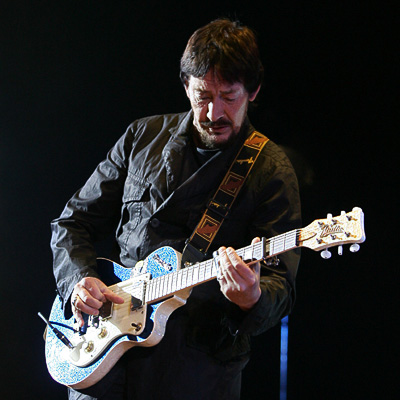
Chris Rea Was Born In 1951 in Middlesbrough.
There are only two guitar players that make me stop whatever I am doing and listen as if each note they are playing were nothing short of irreproducible both technically and sentimentally by anybody else.
As you already know, Richard Thompson is one of them. And now I’d like to introduce you to the other one. Like Thompson, he is also from England. But their styles couldn’t be more different.
Chris Rea is a slide guitar player that spent the first part of his career playing rock & roll until a miraculous recovery from pancreatitis made him decide to devote the rest of his studio life to the blues.
And unlike Richard Thompson, Chris Rea did have hits. His 1989’s album “The Road To Hell” brought him out of cult obscurity across the whole of Europe. “The Road To Hell” will always stand as one of the most meaningful works in a decade that was not that remarkable otherwise. The album offered a razor-sharp study of the stray ways of modern life without ever stooping to the gratuitousness of other contemporary acts.
And the commencement of Rea’s career in 1978 was actually quite auspicious: the song “Fool (If You Think It’s Over)” almost cracked the Top 10 in the US, and remains his most popular song in America to this day. Both that album (named “Whatever Happened to Benny Santini?”) and its follow-up were produced by no other than Gus Dudgeon. Rea has always bemoaned that Dudgeon’s approach was unsuitable for his blues-derived material. The truth is that Dudgeon made one thinly-disguised attempt after the other to have Rea sound like pop acts that had given him worldwide recognition such as Elton John. Chris was to eventually record some of those songs anew later on.
Rea would be unable to replicate the American success of “Fool (If You Think It’s Over)”, although he was to have bursts of success all through the decade in his home continent (“I Can Hear Your Heartbeat”, “Stainsby Girls”) until “The Road To Hell” gave him the projection he actually deserved.
Some of the better examples of his guitar technique include “Nothing To Fear” (a song in which he is a true dynamo), and the full version of “The Road To Hell” (the one that broke Rea all over Europe missed the broody introduction and his foreboding playing).
Some really good anthologies surfaced as the millennium came around. My favorite was (and still is) “The Very Best Of Chris Rea” by Eastwest (2001). It gathers together all his main rock songs, and it features Rea’s tribute to F1 legend Ayrton Senna, “Saudade” in full. I recall the song being played a lot here in South America.
And other compilations like “Still So Far To Go – The Best Of Chris Rea” anthologize both his rock output and his blues-oriented material. They are also quite good (and even indispensable once you have reached a certain listening maturity), but my money is firmly on the one mentioned above if we are talking about people who are new to Middlesbrough’s guitar prodigy.
